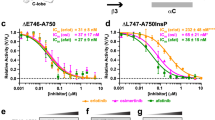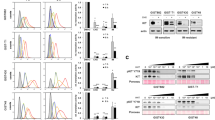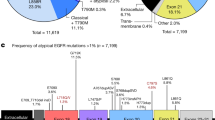Abstract
Elucidation of the genetic processes leading to neoplastic transformation has identified cancer-promoting molecular alterations that can be selectively targeted by rationally designed therapeutic agents. Protein kinases are druggable targets and have been studied intensively. New methodologies—including crystallography and three-dimensional modeling—have allowed the rational design of potent and selective kinase inhibitors that have already reached the clinical stage. However, despite the clinical success of kinase-targeted therapies, most patients that respond eventually relapse as a result of acquired resistance. Darwinian-type selection of secondary mutations seems to have a major role in this resistance. The emergence and/or expansion of tumor clones containing new mutations in the target kinase and that are drug-insensitive have been observed after chronic treatment. The resistance mechanisms to tyrosine kinase inhibitors, in particular secondary resistant mutations as a consequence of treatment, will be discussed in detail. In particular, this Review will focus on KIT and PDGFRA mutations, which are involved in the pathogenesis of gastrointestinal stromal tumors. Harnessing the selection of mutated variants developed to overcome these resistance mechanisms is an ongoing goal of current research and new strategies to overcome drug resistance is being envisaged.
Key Points
-
The pathogenetic role of constitutively activated receptor tyrosine kinases (RTKs) and drugs that specifically target this alteration in cancer has provided a new therapeutic opportunity
-
Despite encouraging early therapeutic results, the development of resistance can occur after a variable period of chronic treatment
-
The emergence of secondary mutations that affect the tyrosine kinase domain of RTKs reduce the drug binding affinity to the enzymatic pocket of the receptor; this resistance can be overcome by the development of drugs that bind efficiently the new mutated RTK forms
-
A new in silico approach is consistent with both biochemical and molecular data and patient clinical outcome and could support clinical decisions to increase the drug dose or administer a different drug
-
In silico molecular modeling can be used to predict the occurrence of all activating but drug-resistant secondary mutations and to develop a multi-drug targeted prevention strategy
This is a preview of subscription content, access via your institution
Access options
Subscribe to this journal
Receive 12 print issues and online access
$209.00 per year
only $17.42 per issue
Buy this article
- Purchase on Springer Link
- Instant access to full article PDF
Prices may be subject to local taxes which are calculated during checkout




Similar content being viewed by others
References
Kan, Z. et al. Diverse somatic mutation patterns and pathway alterations in human cancers. Nature 466, 869–873 (2010).
Baselga, J. Targeting tyrosine kinases in cancer: the second wave. Science 312, 1175–1178 (2006).
Pierotti, M. A. et al. Targeted therapies: the rare cancer paradigm. Mol. Oncol. 4, 19–37 (2010).
Healy, E. F., Johnson, S., Hauser, C. R. & King, P. J. Tyrosine kinase inhibition: ligand binding and conformational change in c-Kit and c-Abl. FASEB J. 583, 2899–2906 (2009).
Liao, J. J. Molecular recognition of protein kinase binding pockets for design of potent and selective kinase inhibitors. J. Med. Chem. 50, 409–424 (2007).
Bikker, J. A., Brooijmans, N., Wissner, A. & Mansour, T. S. Kinase domain mutations in cancer: implications for small molecule drug design strategies. J. Med. Chem. 52, 1493–1509 (2009).
Ahn, Y. M. et al. Switch control pocket inhibitors of p38-MAP kinase. Durable type II inhibitors that do not require binding into the canonical ATP hinge region. Bioorg. Med. Chem. Lett. 20, 5793–5798 (2010).
Swann, S. L. et al. Biochemical and biophysical characterization of unique switch pocket inhibitors of p38alpha. Bioorg. Med. Chem Lett. 20, 5787–5792 (2010).
Lasota, J. & Miettinen, M. Clinical significance of oncogenic KIT and PDGFRA mutations in gastrointestinal stromal tumours. Histopathology 53, 245–266 (2008).
Lasota, J. et al. Clinicopathologic profile of gastrointestinal stromal tumors (GISTs) with primary KIT exon 13 or exon 17 mutations: a multicenter study on 54 cases. Mod. Pathol. 21, 476–484 (2008).
Corless, C. L., Fletcher, J. A. & Heinrich, M. C. Biology of gastrointestinal stromal tumors. J. Clin. Oncol. 22, 3813–3825 (2004).
Conca, E. et al. Activate and resist: L576P-KIT in GIST. Mol. Cancer Ther. 8, 2491–2495 (2009).
Miettinen, M., Sobin, L. H. & Lasota, J. Gastrointestinal stromal tumors of the stomach: a clinicopathologic, immunohistochemical, and molecular genetic study of 1,765 cases with long-term follow-up. Am. J. Surg. Pathol. 29, 52–68 (2005).
Keun, P. C. et al. Prognostic stratification of high-risk gastrointestinal stromal tumors in the era of targeted therapy. Ann. Surg. 247, 1011–1018 (2008).
Blanke, C. D. et al. Long-term results from a randomized phase II trial of standard- versus higher-dose imatinib mesylate for patients with unresectable or metastatic gastrointestinal stromal tumors expressing KIT. J. Clin. Oncol. 26, 620–625 (2008).
Astolfi, A. et al. A molecular portrait of gastrointestinal stromal tumors: an integrative analysis of gene expression profiling and high-resolution genomic copy number. Lab. Invest. 90, 1285–1294 (2010).
Toffoli, G. et al. Genotype-driven phase I study of irinotecan administered in combination with fluorouracil/leucovorin in patients with metastatic colorectal cancer. J. Clin. Oncol. 28, 866–871 (2010).
Bauer, S., Duensing, A., Demetri, G. D. & Fletcher, J. A. KIT oncogenic signaling mechanisms in imatinib-resistant gastrointestinal stromal tumor: PI3-kinase/AKT is a crucial survival pathway. Oncogene 26, 7560–7568 (2007).
Shaw, R. J. & Cantley, L. C. Ras, PI(3)K and mTOR signalling controls tumour cell growth. Nature 441, 424–430 (2006).
Agaram, N. P. et al. Novel V600E BRAF mutations in imatinib-naive and imatinib-resistant gastrointestinal stromal tumors. Genes Chrom. Cancer 47, 853–859 (2008).
Maertens, O. et al. Molecular pathogenesis of multiple gastrointestinal stromal tumors in NF1 patients. Hum. Mol. Genet. 15, 1015–1023 (2006).
Mahadevan, D. et al. A novel tyrosine kinase switch is a mechanism of imatinib resistance in gastrointestinal stromal tumors. Oncogene 26, 3909–3919 (2007).
Miselli, F. C. et al. c-Kit/PDGFRA gene status alterations possibly related to primary imatinib resistance in gastrointestinal stromal tumors. Clin. Cancer Res. 13, 2369–2377 (2007).
Debiec–Rychter, M. et al. Mechanisms of resistance to imatinib mesylate in gastrointestinal stromal tumors and activity of the PKC412 inhibitor against imatinib-resistant mutants. Gastroenterology 128, 270–279 (2005).
Liegl, B. et al. Heterogeneity of kinase inhibitor resistance mechanisms in GIST. J. Pathol. 216, 64–74 (2008).
Liegl, B., Hornick, J. L., Antonescu, C. R., Corless, C. L. & Fletcher, C. D. Rhabdomyosarcomatous differentiation in gastrointestinal stromal tumors after tyrosine kinase inhibitor therapy: a novel form of tumor progression. Am. J. Surg. Pathol. 33, 218–226 (2009).
Tamborini, E. et al. Functional analyses and molecular modeling in two c-kit mutations responsable for imatinib secondary resistence in GIST patients. Oncogene 25, 6140–6146 (2006).
Foster, R., Griffith, R., Ferrao, P. & Ashman, L. Molecular basis of the constitutive activity and STI571 resistance of Asp816Val mutant KIT receptor tyrosine kinase. J. Mol. Graph. Model. 23, 139–152 (2004).
Dileo, P. et al. Imatinib response in two GIST patients carrying two hitherto functionally uncharacterized PDGFRA mutations: an imaging, biochemical and molecular modeling study. Int. J. Cancer 128, 983–990 (2011).
Negri, T. et al. T670X KIT mutations in gastrointestinal stromal tumors: making sense of missense. J. Natl Cancer Inst. 101, 194–204 (2009).
Dixit, A. et al. Sequence and structure signatures of cancer mutation hotspots in protein kinases. PLoS ONE 4, 7485 (2009).
Nishida, T. et al. Sunitinib-resistant gastrointestinal stromal tumors harbor cis-mutations in the activation loop of the KIT gene. Int. J. Clin. Oncol. 14, 143–149 (2009).
Gajiwala, K. S. et al. KIT kinase mutants show unique mechanisms of drug resistance to imatinib and sunitinib in gastrointestinal stromal tumor patients. Proc. Natl Acad. Sci. USA 106, 1542–1547 (2009).
Heinrich, M. C. et al. Primary and secondary kinase genotypes correlate with the biological and clinical activity of sunitinib in imatinib-resistant gastrointestinal stromal tumor. J. Clin. Oncol. 26, 5352–5359 (2008).
Montemurro, M. et al. Nilotinib in the treatment of advanced gastrointestinal stromal tumours resistant to both imatinib and sunitinib. Eur. J. Cancer 45, 2293–2297 (2009).
Casali, P. G. et al. Preliminary data of nilotinib in the first-line treatment of patients with metastatic or unresectable gastrointestinal stromal tumors (GIST) [abstract]. J. Clin. Oncol. 28 (Suppl. 15), TPS332 (2010).
Reichardt, P. et al. Phase III trial of nilotinib in patients with advanced gastrointestinal stromal tumor (GIST): first results from ENEST G3 [abstract]. J. Clin. Oncol. 28 (Suppl. 15), 10017 (2010).
Lee, S. J. & Wang, J. Y. Exploiting the promiscuity of imatinib. J. Biol. 8, 30 (2009).
Schittenhelm, M. M. et al. Dasatinib (BMS-354825), a dual SRC/ABL kinase inhibitor, inhibits the kinase activity of wild-type, juxtamembrane, and activation loop mutant KIT isoforms associated with human malignancies. Cancer Res. 66, 473–481 (2006).
Dewaele, B. et al. Activity of dasatinib, a dual SRC/ABL kinase inhibitor, and IPI-504, a heat shock protein 90 inhibitor, against gastrointestinal stromal tumor-associated PDGFRAD842V mutation. Clin. Cancer Res. 14, 5749–5758 (2008).
Roberts, K. G. et al. Resistance to c-KIT kinase inhibitors conferred by V654A mutation. Mol Cancer Ther. 6, 1159–1166 (2007).
Ou, W. B., Zhu, M. J., Demetri, G. D., Fletcher, C. D. & Fletcher, J. A. Protein kinase C-theta regulates KIT expression and proliferation in gastrointestinal stromal tumors. Oncogene. 27, 5624–5634 (2008).
Gotlib, J. et al. Activity of the tyrosine kinase inhibitor PKC412 in a patient with mast cell leukemia with the D816V KIT mutation. Blood 106, 2865–2870 (2005).
Heinrich, M. C. et al. In vitro activity of novel KIT/PDGFRA switch pocket kinase inhibitors against mutations associated with drug-resistant GI stromal tumors [abstract]. J. Clin. Oncol. 28 (Suppl. 15), 10007 (2010).
Bauer, S., Yu, L. K., Demetri, G. D. & Fletcher, J. A. Heat shock protein 90 inhibition in imatinib-resistant gastrointestinal stromal tumor. Cancer Res. 66, 9153–9161 (2006).
Muhlenberg, T. et al. Inhibitors of deacetylases suppress oncogenic KIT signaling, acetylate HSP90, and induce apoptosis in gastrointestinal stromal tumors. Cancer Res. 69, 6941–6950 (2009).
Bauer, S. et al. Proapoptotic activity of bortezomib in gastrointestinal stromal tumor cells. Cancer Res. 70, 150–159 (2010).
Schoffski, P. et al. A phase I-II study of everolimus (RAD001) in combination with imatinib in patients with imatinib-resistant gastrointestinal stromal tumors. Ann. Oncol. 21, 1990–1998 (2010).
Hohenberger, P. et al., Multicenter, single-arm, two-stage phase II trial of everolimus (RAD001) with imatinib-resistant patients (pts) with advanced GIST [abstract]. J. Clin. Oncol. 28 (Suppl. 15), 10048 (2010).
Richter, S. et al., Multicenter, triple arm, single-stage, phase II trial to determine the efficacy and safety of everolimus (RAD001) in patients with refractory bone or soft tissue sarcomas including GIST [abstract]. J. Clin. Oncol. 28 (Suppl. 15), 10038 (2010).
Wardelmann, E. et al. Polyclonal evolution of multiple secondary KIT mutations in gastrointestinal stromal tumors under treatment with imatinib mesylate. Clin. Cancer Res. 12, 1743–1749 (2006).
Grabellus, F. et al. Double resistance to imatinib and AMG 706 caused by multiple acquired KIT exon 17 mutations in a gastrointestinal stromal tumour. Gut. 56, 1025–1026 (2007).
Nishida, T. et al. Secondary mutations in the kinase domain of the KIT gene are predominant in imatinib-resistant gastrointestinal stromal tumor. Cancer Sci. 99, 799–804 (2008).
Sawyers, C. L. Even better kinase inhibitors for chronic myeloid leukemia. N. Engl. J. Med. 362, 2314–2315 (2010).
Hirota, S. et al. Gain-of-function mutations of c-kit in human gastrointestinal stromal tumors. Science 279, 577–580 (1998).
Heinrich, M. C. et al. PDGFRA activating mutations in gastrointestinal stromal tumors. Science 299, 708–710 (2003).
Hirota, S. et al. Gain-of-function mutations of platelet-derived growth factor receptor alpha gene in gastrointestinal stromal tumors. Gastroenterology 125, 660–667 (2003).
DeMatteo, R. P. et al. Two hundred gastrointestinal stromal tumors: recurrence patterns and prognostic factors for survival. Ann. Surg. 231, 51–58 (2000).
Pasini, B. et al. Clinical and molecular genetics of patients with the Carney-Stratakis syndrome and germline mutations of the genes coding for the succinate dehydrogenase subunits SDHB, SDHC, and SDHD. Eur. J. Hum. Genet. 16, 79–88 (2008).
Janeway, K. A. et al. Succinate dehydrogenase in KIT/PDGFRA wild-type gastrointestinal stromal tumors [abstract]. J. Clin. Oncol. 28 (Suppl. 15), 10008 (2010).
Lim, K. H. et al. Molecular analysis of secondary kinase mutations in imatinib-resistant gastrointestinal stromal tumors. Med. Oncol. 25, 207–213 (2008).
Antonescu, C. R. et al. Acquired resistance to imatinib in gastrointestinal stromal tumor occurs through secondary gene mutation. Clin. Cancer Res. 11, 4182–4190 (2005).
Heinrich, M. C. et al. Molecular correlates of imatinib resistance in gastrointestinal stromal tumors. J. Clin. Oncol. 24, 4764–4774 (2006).
Desai, J. et al. Clonal evolution of resistance to imatinib in patients with metastatic gastrointestinal stromal tumors. Clin. Cancer Res. 13, 5398–5405 (2007).
Acknowledgements
We wish to thank all the INT clinical staff who made this multidisciplinary investigation of GIST possible, in particular Dr. Paolo G. Casali and Dr. Alessandro Gronchi. A special thanks goes to Dr. Elena Fumagalli who answered to all our clinical questions. The authors are partially funded by the Associazione Italiana per la Ricerca sul Cancro (AIRC).
Author information
Authors and Affiliations
Contributions
M. A. Pierotti, E. Tamborini, T. Negri, S. Pricl and S. Pilotti contributed equally to the literature review, discussions of the content, writing the article and to review and/or editing of the manuscript before submission.
Corresponding author
Ethics declarations
Competing interests
The authors declare no competing financial interests.
Rights and permissions
About this article
Cite this article
Pierotti, M., Tamborini, E., Negri, T. et al. Targeted therapy in GIST: in silico modeling for prediction of resistance. Nat Rev Clin Oncol 8, 161–170 (2011). https://doi.org/10.1038/nrclinonc.2011.3
Published:
Issue Date:
DOI: https://doi.org/10.1038/nrclinonc.2011.3
This article is cited by
-
Molecular rationale for SARS-CoV-2 spike circulating mutations able to escape bamlanivimab and etesevimab monoclonal antibodies
Scientific Reports (2021)
-
Gastrointestinal stromal tumours
Nature Reviews Disease Primers (2021)
-
HIF-1α regulates cellular metabolism, and Imatinib resistance by targeting phosphogluconate dehydrogenase in gastrointestinal stromal tumors
Cell Death & Disease (2020)
-
Molecular modelling evaluation of exon 18 His845_Asn848delinsPro PDGFRα mutation in a metastatic GIST patient responding to imatinib
Scientific Reports (2019)
-
The Role of Mast Cells in Molding the Tumor Microenvironment
Cancer Microenvironment (2015)



